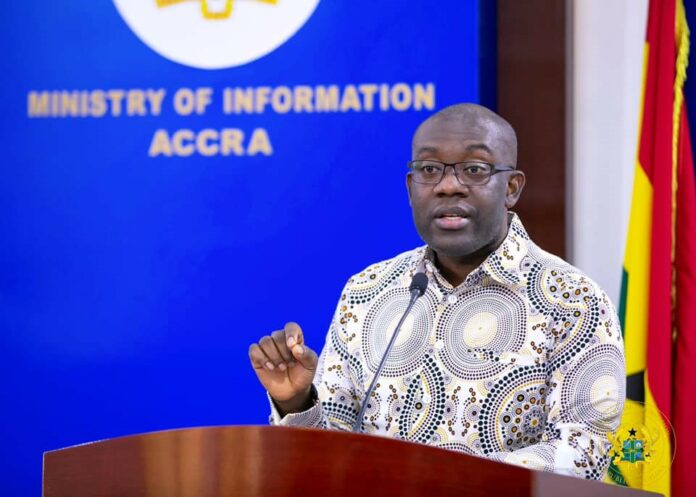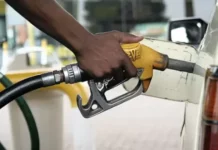The Minority in Parliament has asked the government to immediately withdraw the GHC 1 Fuel Levy and engage stakeholders more on it.
The Minority asked the government to listen to the concerns raised by stakeholders against the levy.
“We are not asking for any permission. We want the government to listen to the driver unions and pull back.”
“Engage some more and find better ways of doing this rather than saying we have the numbers in Parliament, so we will do whatever we want,” Ofoase Ayirebi, lawmaker Kojo Oppong Nkrumah said at a press conference in parliament on Monday, June 9.
Prior to the press conference, a Former Deputy Finance Minister, Abena Osei-Asare, questioned the basis of the introduction of the fuel levy by the Mahama administration at a time when the National Democratic Congress (NDC) promised Ghanaians to relieve them of taxes.
The Member of Parliament for Atiwa East said Ghanaians weren’t expecting this tax due to the promise the NDC gave to them during last year’s election period.
Speaking to Joy FM on Monday, June 9, she said, “Why should you refuse or prevent Ghanaians from enjoying a windfall that they ought to enjoy just because you feel there has been a reduction or appreciation in the cedi against its major trading currencies? We told them that managing the economy is not just about talking and shouting,” she stated.
She added “In your campaign, you told the people of Ghana you were coming to relieve them of the taxes that had been burdening them; you came and all of a sudden you changed,” she noted.
President John Dramani Mahama signed the Energy Sector Levy Act into law on Thursday, June 5.
During the signing at the Jubilee House in Accra, he assured that the money that will accrue from the levy will be used for the purposes for which it will be collected.
“Today, we are signing the Energy Sector Levy Act, all this with the view to trying to eliminate the energy sector debts and stop the crisis in the energy sector and create an energy sector that delivers lower tariffs and better service to our people. I wish to pledge to the Ghanaian people that we are determined to self-redeem the energy sector crisis once and for all and resolve the issue of energy sector debts.
… Although painful it is, to sign this, I was appointed not only to take soft decisions and easy decisions but also to make hard decisions. One of the assurances I gave you is that this money will be used exactly as it is meant for. It won’t be like in the past where the ESLA was collateralised and diverted for other things. ”
He added “Aside from signing this levy, we are also going to reform the power sector so that we are collecting more revenue to be able to pay this debt.
“This Act which has been christened D-levy will not be forever, it is temporary to try and resolve our crisis in the power sector.”
President John Dramani Mahama defended the government’s decision to impose the levy, describing it as a “difficult but necessary” measure to rescue Ghana’s heavily indebted energy sector and prevent further power crises.
Speaking at the Jubilee House on Wednesday, June 4, during the presentation of the final report of the National Economic Dialogue 2025, President Mahama acknowledged public concerns over the levy but stressed that the move is essential for securing the country’s energy future.
“This decision, though difficult, is necessary and justifiable,” the President stated. “It is part of a broader strategy to liquidate debt and stop the bleeding in the power sector.”
According to President Mahama, the energy sector currently carries over US$3.1 billion in debt, with an additional US$1.8 billion required to finance fuel procurements needed for uninterrupted thermal power generation in the coming months.
The levy was passed by Parliament on Tuesday as part of the Energy Sector Levy (Amendment) Bill, 2025, under a certificate of urgency.
It imposes a GHS1 tax on every litre of fuel sold in the country.
President Mahama said the measure follows recommendations from the National Dialogue to take bold action to solve the long-standing energy crisis.
He assured that the estimated GHS5.7 billion in annual revenue from the levy will be ring-fenced and not lodged in the Consolidated Fund.
“Funds from this levy will not be subject to the hazards of the consolidated fund,” Mahama said. “They will be regularly audited, with reports made public to ensure transparent use.”
The ring-fenced funds will be used specifically to:
- Pay down legacy energy sector debts,
- Finance critical fuel purchases, and
- Prevent future power shortages.
President Mahama concluded by urging Ghanaians to support the policy as a responsible and forward-looking solution to one of the country’s most urgent challenges.










